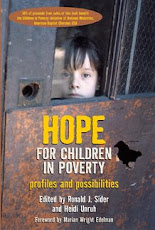As I sat working late at night at a diner, appreciating the bottomless pot of coffee (ah, the things that people with small children are driven to do to get things done!), my train of thought was derailed when a boisterous young crew was seated at a table near mine. Obviously intoxicated, they didn't seem to care who overheard their loud conversation, and their risqué humor and foul language was rather distracting to the theological essay I was attempting to edit. Midway through their meal, one of the young ladies had to rush to the bathroom to throw up.
I was not trying to eavesdrop (in fact, I was trying not to) but I couldn't help overhearing snatches about partying and sexual exploits. But suddenly my attention was riveted when one of them mentioned her toddler daughter. Then another interjected a story about his son—including references to discipline that made me cringe. The casual way in which their children entered the conversation, jumbled together with the off-color comments and general sense of self-absorbed aimlessness, struck me as both pitiable and alarming. As childish young adults, they aroused my compassion; as childish parents, my anger.
I don't know whether they were technically poor, in terms of income. But there are other kinds of poverty. If my snap judgment was correct (I do admit to being judgmental), they looked like poor parents – in the sense of lacking sufficient resources (emotional, relational, informational, social, spiritual) to be able to provide for their children an adequate standard of life. I don't doubt that they love their children, but their expression of that love appears sadly deficient. Their children (again, in my snap judgment) are not necessarily abused or neglected, but they are likely to grow up stunted.
And like income poverty, perhaps one reason this group of young parents lack these resources is because they also grew up without them. Perhaps their parents also were too young, too unstable, too insecure and immature to be able to lay a strong foundation for healthy development in mind, body, soul and spirit. And their children? Will my daughter overhear a similar conversation from the next generation of emotionally impoverished and unprepared parents someday? Or will others step in to "share good news with the poor"?
Wednesday, April 22, 2009
Subscribe to:
Post Comments (Atom)

1 comment:
Heidi, I can't agree more, and my heart is heavy to make a difference. But how do we do this? I see the children of these parents at the school where I mentor--children who struggle academically and emotionally because life at home is challenging. How do we cast vision for these children? How can they know they are valued and valuable? My heart aches because I can't take all of the under my wing . . .
Post a Comment